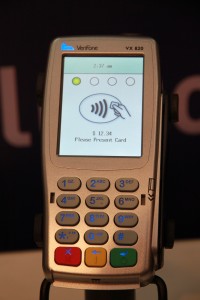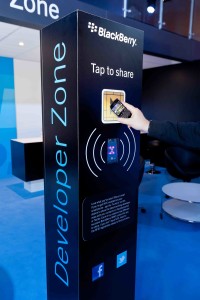October 17th, 2013 by Elma Jane
VeriFone and National Payment Card Association (NPCA) debuted a mobile payment and rewards solution that enables convenience store and petroleum retailers to provide customers with smartphone-based payment options at the pump.
Utilizing VeriFone’s Smart Fuel Controller and NPCA’s mobile payment solution, c-store and gas station operators with VeriFone payment acceptance systems can quickly implement a fixed low-cost mobile payment and rewards program built on existing infrastructure used for merchant branded debit cards.
Consumers are increasingly drawn to rewards-based fuel purchase programs and they expect to be able to use their mobile phone to complete transactions at the pump. NPCA and VeriFone are showing how easy it is for CSPs to offer mobile payment and reward options to customers that increase loyalty and sales.
VeriFone Smart Fuel solutions make it easy for CSPs to offer forecourt pump POS payment without incurring the cost of installing new dispensers. The Smart Fuel Controller combines pump and pay-point support into a single unit, simplifying installation and maintenance, and eliminating the need for third-party interface devices to integrate pay-point management with in-store POS systems.
Merchants can develop their own mobile app, or apply their brand to a mobile app supplied by NPCA, to enable customers to pay for purchases and receive loyalty incentives using their smartphones.
Consumers today would rather utilize the capabilities of their smartphones versus pulling out their wallets. Using this solution, retailers can easily and cost-effectively create mobile loyalty programs that attract and reward high-value customers – without having to replace their existing payment infrastructure.
NPCA’s debit-based payment programs provide retailers with the ability to drive customer loyalty and reduce the cost of payments. Fuel discounts are funded from interchange savings that retailers would otherwise pay to banks. Payment processing is done by NPCA using the automated clearing house (ACH) system to clear debits to cardholder checking accounts and net settle with retailers each day. The company holds five patents related to the processing and methods for ACH-based decoupled debit and mobile payments.
Come November VeriFone and NPCA mobile payments solution will be available for beta testing.
Posted in Electronic Payments, Mobile Payments, Point of Sale, Smartphone, Visa MasterCard American Express Tagged with: acceptance, ach, app, apply, cardholder, consumers, cost, debit cards, devices, infrastructure, interchange, interface, loyalty, merchant, mobile, pay-point, payment, payments, phone, POS, Processing, rewards, sales, smart, Smartphones, solution, transactions, verifone, wallets
October 1st, 2013 by Elma Jane
As Capital One drops support Isis’ future darkens
Capital One pulling its support points to the challenges that near-field-communications is having with scale as non-NFC mobile wallet initiatives take off, as Isis gears up for a broader launch.
Capital One was one of Isis’ three founding card issuers, and the company’s drop of support as the company prepares for a larger roll-out emphasizes the challenges in gaining scale and momentum for mobile payments. PayPal and Apple’s recently announced their own mobile payment options that also avoid NFC reflect the opportunity that marketers see in services beyond NFC.
“Capital One dropping its support for Isis is significant in what it telegraphs about the problems issuers will continue to face with the wallet provider.” “Issuers must pay each time a consumer loads their card onto the wallet.”
“The caveat is that whether or not a consumer uses the card, the issuer must pay to have it in the Isis Wallet. Card issuers are interested in encouraging card spend whereas Isis is purely interested in getting consumers to link their cards to the wallet. This conflict of interest will continue to be problematic.”
Losing support
Capital One pulling its support from Isis could indicate that the financial institution did not see a substantial amount of consumers using their mobile devices to pay during the pilot for repeat visits, which is key in driving consumer adoption ahead. The number of mobile payment options available for card issuers to partner with is clearly growing, meaning that Capital One might see a bigger opportunity elsewhere.
However, Capital One’s pull-out could be well-timed since Isis is signing new partners, and Isis has an opportunity to recover quickly. “Many financial institutions and merchant acquirers see PayPal and Apple as threats and the moves that these companies are making could cause financial institutions, payment networks and acquirers to accelerate their mobile payments efforts in response to the perceived threat.” Since Isis is looking to partner with the financial institutions, payment networks and acquirers, the moves made by Apple and PayPal could drive partners into Isis’ embrace.
Google expands mobile wallet
Yesterday Google made a significant upgrade to Google Wallet that continues to focus on NFC, but also adds additional payment options for consumers. The Google Wallet app has been updated to let consumers send money to friends and family in the U.S. via an email address. Consumers can either send money directly from their bank account or from Google Wallet balance. Additionally, the app is now available for all Android devices that run the 2.3 operating system and higher. Previously, Google Wallet was only available on select Android devices. Consumers can also store loyalty cards from retailers that can be redeemed by scanning a mobile device in-store. Similar to Apple’s Passbook, Google Wallet will now also alert consumers when they are nearby to a store where they have a loyalty program.
Google said that it plans to support the one of 29 different NFC-enabled devices with NFC, but the company’s focus on additional features points to NFC as un-scalable by itself. In fact, Yankee Group estimates that 18 percent of device owners have a mobile device that supports NFC.
Apple, PayPal news
The interest around NFC has also significantly decreased as both PayPal and Apple are rolling out their own mobile payment options. For example, PayPal recently introduced its PayPal Beacon device that lets consumers pay hands-free in exchange for downloading the company’s app. The technology uses Bluetooth to pick up when a consumer is in-store to trigger a payment.
Apple is also working its way around NFC with its iBeacon technology that is rolling out in iOS 7. The technology lets marketers use Bluetooth around stores that can then be used to push out offers and relevant deals.
Both Apple and PayPal’s announcements emphasize the slow adoption that NFC has had in the United States. Although the technology has taken off internationally, it has had a harder time picking up steam in the U.S. because of the low number of NFC-enabled devices.
Broader roll-out
After running pilot programs, Isis is gearing up for a broader roll-out nationally. To date, most of the activity around mobile wallets has focused around the payment section of mobile wallets, which do not have as strong of a value proposition as the coupon and offers side that Isis is forced to prove to merchants.
Additionally, the education behind getting consumers aware of how to use the technology is still clunky, as evidenced by a test at a participating location in Austin by a local mobile consultant.
“Anything in the digital wallet space is a high-risk/high-reward venture at the moment and there are few if any profits being made in this space.” “When that is the case, business continuation is more a question of resolve than a question of competition.” Having multiple players in the market increases the overall quantity of marketing efforts that will take place in the mobile payments arena, increasing the probability that at least one product will succeed.
Posted in Credit card Processing, Credit Card Reader Terminal, Mobile Payments, Near Field Communication Tagged with: Apple, Capital One, google, ISIS, mobile, near field communications, nfc, Passbook, payment, PayPal, wallet, wallets

